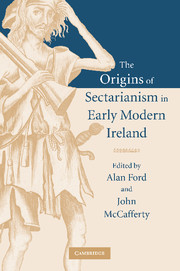Book contents
- Frontmatter
- Contents
- Preface
- List of contributors
- List of abbreviations
- 1 Living together, living apart: sectarianism in early modern Ireland
- 2 Confessionalisation in Ireland: periodisation and character, 1534–1649
- 3 Protestant prelates or godly pastors? The dilemma of the early Stuart episcopate
- 4 ‘In imitation of that holy patron of prelates the blessed St Charles’: episcopal activity in Ireland and the formation of a confessional identity, 1618–1653
- 5 A haven of popery: English Catholic migration to Ireland in the age of plantations
- 6 The Irish historical renaissance and the shaping of Protestant history
- 7 Religion, culture and the bardic elite in early modern Ireland
- 8 The political and religious thought of Florence Conry and Hugh McCaughwell
- 9 Sectarianism: division and dissent in Irish Catholicism
- 10 Purity of blood and purity of faith in early modern Ireland
- 11 Concluding reflection: confronting the violence of the Irish reformations
- Index
4 - ‘In imitation of that holy patron of prelates the blessed St Charles’: episcopal activity in Ireland and the formation of a confessional identity, 1618–1653
Published online by Cambridge University Press: 24 November 2009
- Frontmatter
- Contents
- Preface
- List of contributors
- List of abbreviations
- 1 Living together, living apart: sectarianism in early modern Ireland
- 2 Confessionalisation in Ireland: periodisation and character, 1534–1649
- 3 Protestant prelates or godly pastors? The dilemma of the early Stuart episcopate
- 4 ‘In imitation of that holy patron of prelates the blessed St Charles’: episcopal activity in Ireland and the formation of a confessional identity, 1618–1653
- 5 A haven of popery: English Catholic migration to Ireland in the age of plantations
- 6 The Irish historical renaissance and the shaping of Protestant history
- 7 Religion, culture and the bardic elite in early modern Ireland
- 8 The political and religious thought of Florence Conry and Hugh McCaughwell
- 9 Sectarianism: division and dissent in Irish Catholicism
- 10 Purity of blood and purity of faith in early modern Ireland
- 11 Concluding reflection: confronting the violence of the Irish reformations
- Index
Summary
In February 1630, David Rothe, the Catholic bishop of Ossory, justifying himself first by the example of Clement VIII, who had delegated Bellarmine to act as his conscience concerning the exercise of his authority, and second by the practice of Saint Charles Borromeo, who welcomed frank admonitions concerning any lapses in his behaviour, took it upon himself to direct a letter of criticism to his metropolitan superior, the archbishop of Dublin. The response of the archbishop, Thomas Fleming, was a barbed refutation of the charges contained in the letter but, while clearly seething with indignation, he accepted the legitimacy of Ossory's behaviour and ‘in imitation of that holy patron of prelats saint Charles’ he dignified his suffragan's admonitions with an extensive answer and thanked him for his ‘brotherly freedom and frenly cenceritie’. The sincerity of Fleming's own thanks in this regard is perhaps open to question but it is interesting that the parameters of their exchange were defined by a consciously Tridentine notion of episcopal practice.
That two seventeenth-century bishops should model their behaviour on Charles Borromeo in particular is, on the one hand, in no way surprising. The archbishop of Milan, canonised only twenty-six years after his death, quickly became the iconic saint-bishop of the Catholic reformation. By the end of the sixteenth century, editions of the Acta ecclesiae mediolanensis were circulating widely in France and inspiring a host of examples, while Borromeo's instructions to confessors remained one of the staples of French pastoral literature throughout the early modern period.
- Type
- Chapter
- Information
- The Origins of Sectarianism in Early Modern Ireland , pp. 73 - 94Publisher: Cambridge University PressPrint publication year: 2005
- 1
- Cited by



